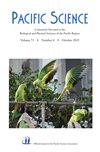夏威夷野生动物引种的历史生态学1
IF 0.7
4区 生物学
Q4 MARINE & FRESHWATER BIOLOGY
引用次数: 4
摘要
摘要:一个地区的历史生态学可以从生物文化的角度来理解,在生物文化的视角下,人类的社会系统和生态系统是相互关联和相互依存的。我们利用这样一个视角来调查在过去230年中,社会经济、政治和文化观点对夏威夷有意引入至少91种猎物的影响。自欧洲接触以来(1778年),有关野味物种引入和岛间迁移的历史记录被描述为与历史事件有关。公众对游戏的看法随着当时盛行的文化气候而变化,与五大政治事件所划分的历史时期相对应:欧洲接触(1778年)、夏威夷王国(1819年)、Hawai'i领土(1898年),第二次世界大战结束(1945年)和《濒危物种法》(1973年)。在夏威夷,环境管理方法与不断变化的文化价值观相结合,由此产生的游戏管理政策反映了对游戏物种的看法从宝贵的食物来源到娱乐运动再到生态公害的转变。这种对政治、经济和生态系统之间相互关系的认识,使我们能够更好地利用过去的经验教训,通过鼓励资源管理者在制定有效的当前和未来生态管理目标时考虑文化因素,实现未来的变革。本文章由计算机程序翻译,如有差异,请以英文原文为准。
The Historical Ecology of Game Species Introductions in Hawai‘i1
Abstract: The historical ecology of an area can be best understood from a biocultural perspective in which human social systems and ecosystems are interrelated and interdependent. We utilized such a perspective to investigate the effects of socioeconomic, political, and cultural viewpoints on the intentional introduction of at least 91 game species to Hawai‘i over the past 230 years. Historical records of game species introductions and inter-island translocations were described in relation to historical events since European contact (1778). Changes in public opinion toward game shifted according to the prevailing cultural climate of the time, corresponding with historical periods that can be demarcated by five major political events: European contact (1778), the Kingdom of Hawai‘i (1819), the Territory of Hawai‘i (1898), the end of World War II (1945), and the Endangered Species Act (1973). In Hawai‘i, environmental management approaches have been integrated with changing cultural values, and the resultant game management policies have reflected shifting views of game species from valuable food sources to recreational sport to ecological nuisance. Such recognition of the interrelationship between politics, economics, and ecosystems allows us to better utilize past lessons to bring about future change by encouraging resource managers to consider cultural factors when formulating effective present and future ecological management goals.
求助全文
通过发布文献求助,成功后即可免费获取论文全文。
去求助
来源期刊

Pacific Science
生物-动物学
CiteScore
1.40
自引率
14.30%
发文量
17
审稿时长
3 months
期刊介绍:
Pacific Science: A Quarterly Devoted to the Biological and Physical Sciences of the Pacific Region
The official journal of the Pacific Science Association. Appearing quarterly since 1947, Pacific Science is an international, multidisciplinary journal reporting research on the biological and physical sciences of the Pacific basin. It focuses on biogeography, ecology, evolution, geology and volcanology, oceanography, paleontology, and systematics. In addition to publishing original research, the journal features review articles providing a synthesis of current knowledge.
 求助内容:
求助内容: 应助结果提醒方式:
应助结果提醒方式:


